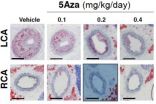(Press-News.org) Concerns about guardianship and privacy can discourage clinics from testing children for HIV, according to new research from Zimbabwe published this week in PLOS Medicine. The results of the study, by Rashida A. Ferrand of the London School of Hygiene & Tropical Medicine and colleagues, provide much-needed information on how to improve care of this vulnerable population.
More than three million children globally are living with HIV (90% in sub-Saharan Africa) and in 2011 an estimated 1000 infant infections occurred every day. HIV acquired through mother-to-child transmission around the time of birth is often unsuspected in older children, and the benefits of treatment are diminished in children who develop symptoms of immune system failure before infection is discovered.
Provider-initiated HIV testing and counseling (PITC) involves health care providers routinely recommending HIV testing and counseling when people attend health care facilities. To investigate the provision and uptake of PITC among children between 6 and 15 years old, the researchers collected and analyzed data from staff at 6 clinics in Harare, Zimbabwe.
Among 2,831 eligible children, about three-quarters were offered PITC, of whom 1,534 (54.2%) consented to HIV testing. The researchers diagnosed HIV infection in about 1 in 20 (5.3%) of the children tested, highlighting the need for more effective PITC. HIV infection was also found in 1 out of 5 guardians who tested with a child.
The main reasons that health-care workers gave for not offering PITC were perceived unsuitability of the accompanying guardian to provide consent for HIV testing on behalf of the child, and lack of availability of staff or HIV testing kits. Children who were asymptomatic, older, or attending with a male or a younger guardian were less likely to be offered HIV testing. Male guardians were less likely to consent to their child being tested.
In interviews, health-care workers raised concerns that a child might experience maltreatment if he or she tested positive, and showed uncertainty around whether testing of the guardian was mandatory and whether only a parent (if one was living) could legally provide consent. When parents were alive but not present, seeking consent from another adult raised ethical concerns that a positive HIV test in a child would disclose the HIV status of a parent who hadn't provided consent.
The study, which was funded by the Wellcome Trust, did not explore the reasons for refusal of HIV testing by clients. Also, because the relationship of the child to the accompanying adult was not available, the appropriateness of the guardian could not be independently ascertained.
Lead author Dr. Rashida Ferrand from the London School of Hygiene & Tropical Medicine said: "The fear of the stigma faced by the child and their family seems to be discouraging caregivers from testing children for HIV. However, with improved clarity of guidelines, engagement with staff, and organisational adjustments within clinics, it should be possible to harness the commitment of health-care workers and properly implement HIV testing and counseling."
In an accompanying Perspective, Mary-Ann Davies and Emma Kalk of the University of Cape Town, who were uninvolved in the study, point out that "The fact that >90% of infected children had a previous missed opportunity for testing indicates suboptimal pediatric PITC coverage in most routine settings," and call for "clear HIV testing policies for children and guidance on guardianship, together with training of [health-care workers] on such policies."
INFORMATION:
Research Article
Funding: The study was funded by the Wellcome Trust through an Intermediate Fellowship to RAF (Grant No: 095878/Z/11Z). The funders had no role in study design, data collection and analysis, decision to publish, or preparation of the manuscript.
Competing Interests: The authors have declared that no competing interests exist.
Citation: Kranzer K, Meghji J, Bandason T, Dauya E, Mungofa S, et al. (2014) Barriers to Provider-Initiated Testing and Counselling for Children in a High HIV Prevalence Setting: A Mixed Methods Study. PLoS Med 11(5): e1001649. doi:10.1371/journal.pmed.1001649
Author Affiliations:
London School of Hygiene and Tropical Medicine, United Kingdom
Biomedical Research and Training Institute, Zimbabwe
Harare City Health Department, Zimbabwe
Population Services International, Zimbabwe
University of Zimbabwe, Zimbabwe
IN YOUR COVERAGE PLEASE USE THIS URL TO PROVIDE ACCESS TO THE FREELY AVAILABLE PAPER:
http://www.plosmedicine.org/article/info%3Adoi%2F10.1371%2Fjournal.pmed.1001649
Contact:
Press Office at the London School of Hygiene & Tropical Medicine
UNITED KINGDOM
+44 (0) 207 927 2802
press@lshtm.ac.uk
Perspective Article
Funding: MAD receives funding from the National Institutes of Allergy and Infectious Diseases (Grant 2U01AI069924) and both authors receive funding from the National Institute of Child Health and Human Development (R01HD075156). The funders had no role in study design, data collection and analysis, decision to publish, or preparation of the manuscript.
Competing Interests: The authors have declared that no competing interests exist.
Citation: Davies M-A, Kalk E (2014) Provider-Initiated HIV Testing and Counselling for Children. PLoS Med 11(5):e1001650. doi:10.1371/journal.pmed.1001650
Author Affiliations:
University of Cape Town, South Africa
IN YOUR COVERAGE PLEASE USE THIS URL TO PROVIDE ACCESS TO THE FREELY AVAILABLE PAPER:
http://www.plosmedicine.org/article/info%3Adoi%2F10.1371%2Fjournal.pmed.1001650
Contact:
Mary-Ann Davies
Infectious Disease Epidemiology Unit
School of Public Health
University of Cape Town
3 Buxton Ave.
Cape Town, Western Cape 8001
SOUTH AFRICA
27 21 406 6487
Mary-ann.Davies@uct.ac.za
Barriers to HIV testing in older children
2014-05-28
ELSE PRESS RELEASES FROM THIS DATE:
Making research findings freely available is an essential aid to medical progress
2014-05-28
In a PLOS Medicine guest editorial, Paul Glasziou, Professor of Evidence-Based Medicine at Bond University in Australia, explores how open access publications could help moderate and reduce the vast waste of global medical research.
Continuing on from his previous work, which highlighted how most of the world's expenditure on medical research was thrown away, Glasziou outlines how bad the situation is and suggests how it might be improved. Subscription-based academic journals make money by through copyrights assigned by authors to publishers who lock the articles behind ...
Dealing with stress -- to cope or to quit?
2014-05-28
Cold Spring Harbor, NY – We all deal with stress differently. For many of us, stress is a great motivator, spurring a renewed sense of vigor to solve life's problems. But for others, stress triggers depression. We become overwhelmed, paralyzed by hopelessness and defeat. Up to 20% of us will struggle with depression at some point in life, and researchers are actively working to understand how and why this debilitating mental disease develops.
Today, a team of researchers at Cold Spring Harbor Laboratory (CSHL) led by Associate Professor Bo Li reveals a major insight ...
Intertwined evolution of human brain and brawn
2014-05-28
The cognitive differences between humans and our closest living cousins, the chimpanzees, are staggeringly obvious. Although we share strong superficial physical similarities, we have been able to use our incredible mental abilities to construct civilisations and manipulate our environment to our will, allowing us to take over our planet and walk on the moon while the chimps grub around in a few remaining African forests.
But a new study suggests that human muscle may be just as unique. Scientists from Shanghai's CAS-MPG Partner Institute for Computational Biology, together ...
Disturbance in blood flow leads to epigenetic changes and atherosclerosis
2014-05-28
Disturbed patterns of blood flow induce lasting epigenetic changes to genes in the cells that line blood vessels, and those changes contribute to atherosclerosis, researchers have found. The findings suggest why the protective effects of good blood flow patterns, which aerobic exercise promotes, can persist over time. An epigenetic change to DNA is a chemical modification that alters whether nearby genes are likely to be turned on or off, but not the letter-by-letter sequence itself.
The results are scheduled for publication in the Journal of Clinical Investigation.
Atherosclerosis ...
Keeping active pays off even in your 70s and 80s
2014-05-28
Older people who undertake at least 25 minutes of moderate or vigorous exercise everyday need fewer prescriptions and are less likely to be admitted to hospital in an emergency, new research has revealed.
The findings, published in the journal PLOS ONE, reinforce the need for exercise programmes to help older people stay active. It could also reduce reliance on NHS services and potentially lead to cost savings.
In the first study of its kind looking at this age group, researchers from the University of Bristol looked at data from 213 people whose average age was 78.
Those ...
Endoscopic procedure does not reduce disability due to pain following gallbladder removal
2014-05-27
In certain patients with abdominal pain after gallbladder removal (cholecystectomy), undergoing an endoscopic procedure involving the bile and pancreatic ducts did not result in fewer days with disability due to pain, compared to a placebo treatment, according to a study in the May 28 issue of JAMA.
Post-cholecystectomy pain is a common clinical problem. More than 700,000 patients undergo cholecystectomy each year in the United States, and at least 10 percent are reported to have pain afterwards. Most of these patients have no significant abnormalities on imaging or ...
Study examines variation in cardiology practice guidelines over time
2014-05-27
An analysis of more than 600 class I (procedure/treatment should be performed/administered) American College of Cardiology/American Heart Association guideline recommendations published or revised since 1998 finds that about 80 percent were retained at the time of the next guideline revision, and that recommendations not supported by multiple randomized studies were more likely to be downgraded, reversed, or omitted, according to a study in the May 28 issue of JAMA.
As adherence to recommended clinical practice guidelines increasingly is used to measure performance, ...
Penn study: Longest-lasting cardiology guidelines built on findings of randomized controlled trials
2014-05-27
PHILADELPHIA –Clinical practice guideline recommendations related to screening and treatment can change markedly over time as new evidence about best practices and clinical outcomes of various treatments emerges. In a first-of-its-kind study, Penn Medicine researchers examined high-level recommendations published by the American College of Cardiology (ACC) and the American Heart Association (AHA) between 1998 and 2007 and found that recommendations which were supported by multiple randomized controlled trials were the most "durable" and least likely to change over time. ...
Citizens help researchers to challenge scientific theory
2014-05-27
Science crowdsourcing was used to disprove a widely held theory that "supertasters" owe their special sensitivity to bitter tastes to an usually high density of taste buds on their tongue, according to a study published in the open-access journal Frontiers in Integrative Neuroscience.
Supertasters are people who can detect and are extremely sensitive to phenylthiocarbamide and propylthiouracil, two compounds related to the bitter molecules in certain foods such as broccoli and kale. Supertasting has been used to explain why some people don't like spicy foods or "hoppy" ...
Study identifies risk of chemotherapy related hospitalization for eary-stage breast cancer patients
2014-05-27
Oncologists now have a new understanding of the toxicity levels of specific chemotherapy regimens used for women with early stage breast cancer, according to research from The University of Texas MD Anderson Cancer Center.
The retrospective study, published in the Journal of Clinical Oncology, used large population-based data to compare the risk of hospitalization for six common chemotherapy regimens. Reasons for hospitalization included infection, fever, anemia, dehydration, neutropenia (low white blood cell count), thrombocytopenia (low blood platelets) and delirium. ...




